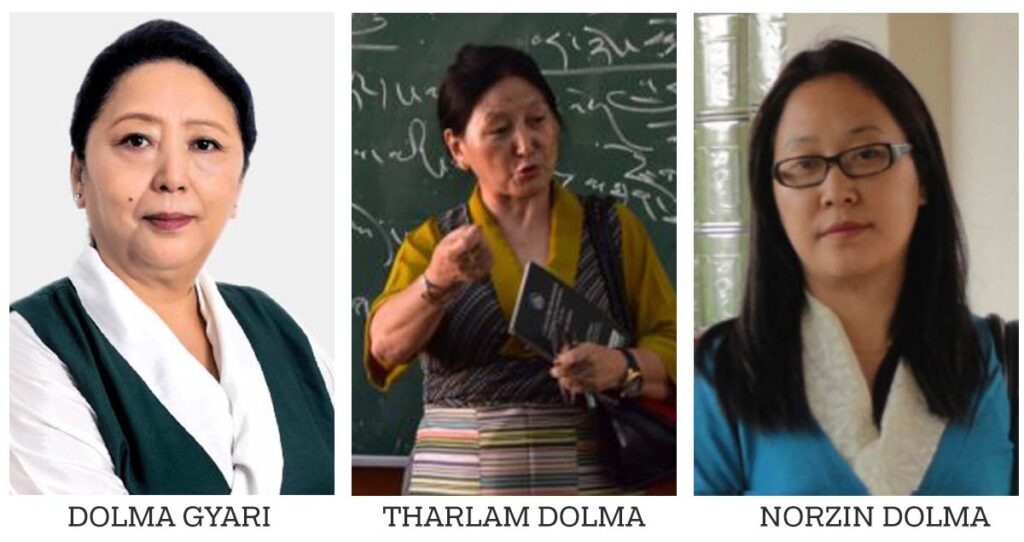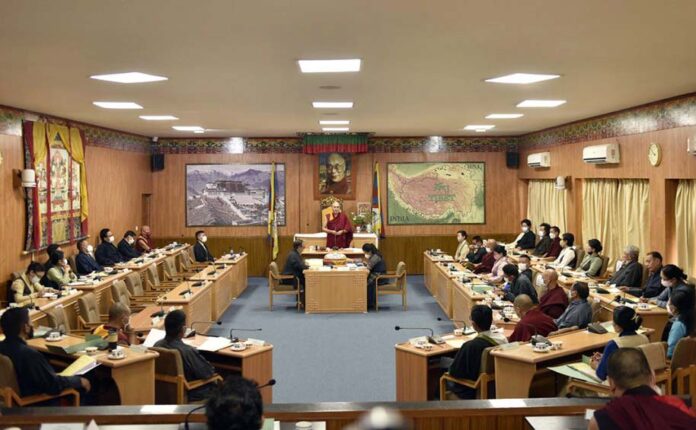(TibetanReview.net, Oct11’21) – The two-day session of the 17th Tibetan Parliament in Exile (TPiE) began on a stormy note on Oct 11 with the members rejecting an amendment to the Charter of Tibetans in Exile, confirming only three of six names proposed by the Sikyong (President) as Kalons (Ministers) of the Central Tibetan Administration CTA) and 19 members staging a walkout over a candidate’s nomination for Kalon.
A bill to amend Article 63(2)(c) of the Charter of Tibetans in Exile on the qualifications for appointment as a justice Commissioner of the Tibetan Supreme Justice Commission was thwarted by a section of the members on the unrelated issue of the legitimacy of the current justice commissioners’ continuance in office. They refused to discuss the bill, both directly and by obvious implication, saying so long as the current justice commissioners continued in office, they will not discuss the bill. With only 20 of the 45 members agreeing to discuss it, against the requirement of at least 30, the bill stood rejected.
Sikyong Penpa Tsering then made six nominations for confirmation as Kalons of the CTA. The three women nominees were confirmed. Norzin Dolma won 27 “yes” votes against 18 “no’s”. She is a former head of the Tibetan Centre for Human Rights and Democracy. Changra Tharlam Dolma also won 27 “yes” votes against 18 “no’s”. She is a former school teacher and school administrator. And Dolma Gyari, a former Kalon and TPiE members, won 30 “yes” votes against 11 “no’s”.
Thupten Lungrig, former Kalon and TPiE member got 18 votes while Tsultrim Dorje, a school teacher won 13, both falling short of the simple majority of 23 needed for confirmation.

Dotoe members Serta Tsultrim rose to react with anger when the name of current U-Tsang TPiE member Ngodup Dorje, a retired career CTA officer, was nominated for a Kalon post. His objection was over a remark the candidate was alleged to have made during the nearly four months of a section of the elected candidates’ failure to take their oath of office for the 17th TPiE. He led a boycott of the meeting by 19 members of his apparent faction. The meeting then fell short of the required minimum of two-thirds quorum and was rendered unable to conduct business.
***
Earlier, following the resolution of the issue about the continued viability of the Charter of Tibetans in Exile, thanks to an advisory from His Holiness the Dalai Lama which affirmed its sanctity, the 17th TPiE constituted its first Standing Committee on Oct 10 and held the first of its two-day session on Oct 11.
The Standing committee members were allocated their committee portfolios, of which there were three: Finance, Political, and Administration. The Standing Committee is made up of two members from each of the three provincial constituencies and one each from the five religious constituencies.
The session began with the members “pledging to firmly resolve the political issue of Tibet peacefully, resolve human rights and environmental crisis in Tibet, and oversee the welfare of Tibetans in exile,” as reported by the CTA on its Tibet.net website Oct 11.
Eight official resolutions of mourning to condole the demise of two former Tibetan parliamentarians and some prominent Tibet supporters were stated to have been tabled.
***
With the recent divisive politics that were behind the failure to constitute the 17th TPiE for nearly four months fresh in mind, Speaker Khenpo Sonam Tenphel had hoped the new parliament would live up to the hope and confidence vested in them by the Tibetan people.
The Speaker had urged the members to respect each other’s opinions while maintaining morality and unity throughout the two-day session. He has also advised the members against making divisive remarks for the sake of the harmony of the Tibetan community.
The TPiE usually meets twice each year, one in March to debate and approve the annual budget of the CTA and the other in September to discuss reports of the departments of the CTA, each one typically lasting around 10 days.






